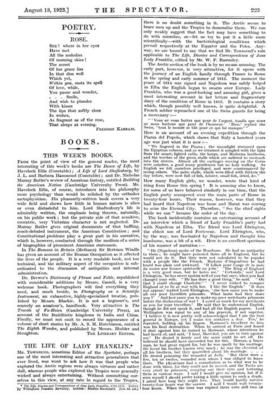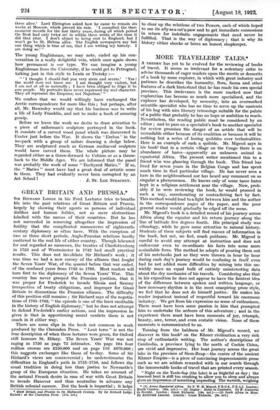THE LIFE OF LADY FRANKLIN.*
MR. TOWNSEND, sometime Editor of the Spectator, perhaps one of the most interesting and attractive generalizers that ever lived, was wont to ask how it was that people who explored the Arctic regions were always virtuous and rather dull, whereas people who explored the Tropics were generally wicked and always entertaining. Without committing ourselves to this view, at any rate in regard to the Tropics, there is no doubt something in it. The Arctic seems to brace men up and the Tropics to demoralize them. We can only weakly suggest that the fact may have something to do with microbes, or—let us try to put it a little more scientifically—with the bacteriological conditions which prevail respectively at the Equator and the Poles. Anyway, we are bound to say that we fmd Mr. Townsend's rule applicable to The Life, Diaries and Correspondence of Jane Lady Franklin, edited by Mr. W. F. Rawnsley.
The Arctic section of the book is by no means amusing. The early part, however, is very attractive, for it opens with the journey of an English family through France to Rome in the spring and early summer of 1815. The moment the peace of 1814 was signed and Napoleon was safely lodged in Elba the English began to swarm over Europe. Lady Franklin, who was a good-looking and amusing girl, gives most interesting account in her letters and fragmentary diary of the condition of Rome in 1815. It contains a story which, though possibly well known, is quite delightful. A French soldier reproached one of the Swiss guards for being a mercenary :
" ' Vous ne vous battez que pour de l' argent, tandis que nous ne nous battons que pour de l'honneur.' Bien,' replied the Swiss, 'tout le monde se bat pour ce qui lui manque.' " Here is an account of an evening expedition through the Piazza del Popolo, which shows that Italy a hundred years ago was just what it is now :— " We lingered in the Piazza ; the moonlight streamed upon the Egyptian column, and as we returned it mingled with the light from the smart, lighted cafes, the lamps, and Madonna lanthorns, and the torches of the green stalls which are suffered to encroach into the streets. Almost all the carriages moving on the Corso were calashes, a good many gentlemen but no lady walking. As English we felt ourselves privileged, and were countenanced by seeing others. The palm stalls, which were filled with fritters the day before, were now full of fish, lobster, small fish, dried, &c."
How many English girls, we wonder, wrote that kind of thing from Rome this spring ? It is amusing also to know, for some of us have behaved similarly in our time, that the English party scampered over the main parts of Rome in twenty-four hours. Their reason, however, was that they had heard that Napoleon was loose and Murat was coming to seize the Eternal City. Therefore, " See the chief sights while we can " became the order of the day.
The book incidentally contains an entertaining account of an interview which a friend of Lady Franklin's party had with Napoleon at Elba. The friend was Lord Ebrington, the eldest son of Lord Fortescue. Lord Ebrington, who, by the way, was fascinated by Napoleon and thought him handsome, was a bit of a wit. Here is an excellent specimen of his manner of narration :
" He (Napoleon) spoke of the Bourbons. He had no antipathy to them ; he might have poisoned them all in England, but ho would not do it. But they were not calculated to be popular with a people like the French. Madame d'Angouleme he had heard was plain and awkward. '11 fallait pour range de is paix du morns une femme spirituelle ou jolie.' The King of Englund is a very good man, but he hates me.' Certainly,' said Lord Ebrington, 'he has never spoken well of you but once, when you had changed your wife. "He has done u'good thing," he said. " Oh that I could change Charlotte." ' I never wished to conquer England or to be at war with her. I like the English.' It does not appear,' replied Lord Ebrington, else how came you to make all our poor travellers prisoners. What harm had they done you 1' And how came you to make my poor merchants prisoners before the declaration of war 1 I cared as much for my merchants as you for your travellers.' He said that he understood English. though he did not speak it, and had all the English papers. Lord Wellington was equal to any of his generals, if not superior. I believe it is now pretty well acknowledged that I am the best general in Europe, yet I make ten mistakes a day. Ten,' he repeated, holding up his fingers. Marmont's treachery to 131111 was his final destruction. When he arrived at Paris and found it shut against him he turned to Marmont, whose intentions he had heard of, and said, ' I hear, Mareehal, you are to turn against me.' He denied it firmly and the same night he set off. He believed he should have succeeded but for this. Moreau, a brave man, he had great regard for, but he was spoilt by his marriage. He loved his brother Lucien very much ; he was the cleverest of all his brothers, but they quarrelled about his marriage. . •
He denied poisoning the wounded at Jaffa. 'But there were a few, ten or twelve, wounded men whom I was obliged to leave there. The physicians had a consultation as to what was to be done with them, for they could not be moved, and the Turks are very cruel to prisoners, scooping out their eyesand torturing them in various ways. I said I would give no opinion, but if it were myself I should prefer taking a little opium to such a death. I asked how long they might live. They would hardly survive twenty-four hours was the answer. I said I would wait twentyfour hours. When the time was expired there were still two or
three alive.' Lord Ebrington asked how he came to remain six weeks at Moscow, which proved his ruin. ' I consulted the therznometer records for the last thirty years, during all which period the frost had only twice set in within three weeks of the tune it did that year. I don't object to being sent to England, but I won't go to St. Helena alive. The English newspapers say but one thing which is true of me, that I am writing my history. I am doing so.' "
The young Englishman, we may note, ended up his conversation in a really delightful vein, which once again shows how permanent is our type. We can imagine a young Englishman from the University, if he could get to Petrograd, talking just in this style to Lenin or Trotsky :—
" I thought I should find you very stern and severe.' Yes ! the world does not know me. I am thought very violent, but I am not at all so naturally ; I have been obliged to feign it to awe people. My portraits have never expressed my real character. They all represent the Emperor, not Napoleon.' " We confess that we would willingly have exchanged the Arctic correspondence for more like this ; but perhaps, after all, Mr. Rawnsley would say that his business was to write a life of Lady Franklin, and not to make a book of amusing gossip.
Before we leave the work we desire to draw attention to a piece of sailorman's sculpture portrayed in the book. It consists of a carved wood panel which was discovered in Exeter just before the War. It shows the ' Erebus ' in the ice-pack with a group of sailors drawing a sledge below. They are sculptured much as German mediaeval sculptors would have carved them. The whole picture may be regarded either as a throw-forward to Cubism or as a throwback to the Middle Ages. We arc informed that the panel
was probably the work of some " Dockyard Maties." If so, the " Maties " must have had a great deal of artistic sense In them. They had evidently never been corrupted by an
Art School I •J. ST. LOE STRACIIEY.



































 Previous page
Previous page